- Home
- Claire North
The Pursuit of William Abbey Page 14
The Pursuit of William Abbey Read online
Page 14
By the early afternoon, a militia of local men had organised to reinforce the British efforts, all in the name of the raja. The rani had gone mad, they said; there was treason in the palace. By cooperating with the British, order would be quickly restored, and if that wasn’t good enough reason to pick up an ancient gun and your best feathered cap, the instant the militia received endorsement for its work with a puffed “yes yes, whatever!” from a newly promoted major, they too could join in the time-honoured orderly practice of ransacking the homes of people they disliked, or who might have a nice pocket watch they could steal.
In this way, in the name of law, order and the good of the people, Vaniyali fell into total bloody chaos.
I hid beneath a copse of trees threaded with hanging moss outside the palace, Saira by my side, watching the city burn. She had no real interest in being near me, but at that moment the colour of my skin was the only protection I could offer, and it would do. I was not looking for the truth of her shadow, but it came upon me as soft as a hand brushing my cheek, and I said, “Your shadow is near.”
She glanced my way, and nodded once, and now her silence had a different weight to it, for she was terrified that if she opened her mouth and spoke, the truth would come tumbling out in a cascade.
I nodded again, the smoke from the flames of the city drifting in between the hanging leaves, pinching at my eyes and charring my lips. Held out my hand; she took it without a word.
Chapter 33
They say the foothills of the Himalayas are the Garden of Eden rediscovered, but that day Vaniyali was a hell on earth. Who started the fire, no one knew, but no one in a position to put it out cared. It swayed like a living beast through the city, seeming now to sit hunkered like a prowling cat at the end of the road, only to close its jaws and blot out the sun, pushing people into tighter and tighter spaces as they ran any way that wasn’t into the flames. And yet now, turn a corner and some streets were silent, shuttered down, as if the inhabitants had single-mindedly concurred at the same instant that no one existed and nothing moved, even the chickens and the children hushed behind blocked doors. Others were total mayhem, groups of militia and redcoats bursting into homes that had already been three times burst through to pick over the skeletons of households judged insurrectionist by whatever criteria was most profitable for this minute, while above the flames still climbed and climbed, reflecting scarlet off the smoky mirror of the sky.
Twice we ran into armed native men: one group with ancient flintlock muskets that looked like they couldn’t fire a shot, but that would have been more than enough to batter us to death; and one with a mix of scythes and sticks transformed into weapons by the addition of nails or wrapped weights. To them both Saira blurted that I was an American journalist, and she was guiding me to safety that I might report on the terrible British injustices and bring the truth to the world.
The absolute confidence with which she said this astonished me; the truth of men’s hearts flowed through her fingers like silk through the loom, and she responded to every beat of every soul in every chest while I still reeled from the battery of truths that came upon me from each eye I met.
When we at last stumbled on British soldiers, I hollered that I was with Mudeford, and that Saira was my translator, and that we needed escort immediately to the consulate and transport out of town. The desperation in my voice must have carried some effect, because four men were immediately assigned to escort us to the consul’s encircled home, and the truth of their hearts was that this was just another job, and they’d have liked to get a bit more booty from it, and it sickened them to see these damn coolies making a profit while they had to stand by waiting for permission to take what should have been rightfully theirs, and that was about all they felt on the situation. Not the crying of children nor the weeping of mothers thrown to the dust annoyed them half as much as not getting their fair share.
By the time we reached the consulate, Saira was beginning to mutter under her breath. I didn’t know the language she spoke, but could recognise the potency of it, the power of the shadow as it came near, the pressure of truth erupting from her lips. Sometimes, in between the gibbered noises, she grabbed my sleeve and blurted, “I need… need to… he’s coming!” and the truth of her heart was that she didn’t know who she loved, but the face of her son still terrified her more than the truth-speaker’s tongue could say.
I found Mrs Parr upstairs, looking down on the chaos below and the fires above. “Where have you been?” she demanded as I burst through the door. “What the hell even happened? What’s this about the rani?”
“Shadow, here now!” I snapped. “Need to go now! Now!”
Mrs Parr, for all that she had been appointed to be ignored, was good in a crisis. “Horses!” she bellowed. “This man needs horses!”
We had horses saddled and ready in four minutes, and an escort of seven riders in red to see us out of town. Saira now had her hands pressed over her mouth, even as I tried to boost her up into a saddle.
“She all right, sir?” asked one of our escorts.
“Just hysterical!” I replied, briefly grateful to the generations of physicians who had used this as an excuse for almost anything a woman did since the dawn of time. “I’m a doctor. We have to go now!”
We galloped away from Vaniyali, and Saira didn’t look back.
I did, and thought for an instant that I saw the shadow of Langa – or no, not of Langa. This boy was younger, smaller, with wild hair grown around his head and little fingers that reached out to be held. He moved at the same relentless, endless pace of my shadow, following for ever, but it was Saira that he reached for, not me, and he was lost to the dust thrown from our horse’s hooves as we raced away from the fires and the mountain.
Chapter 34
This is the truth of Saira’s heart:
When she was a young mother, little more than a girl, her husband and son had both died within a few days of each other, taken by the same fever, and she had lived. It had been politely expected that she would either kill herself or cut herself off entirely from society, as widows brought terrible bad luck. She had done neither of these things, the one being entirely distasteful to both her and her deceased love – and the other being untenable for a woman who still, despite her grief, craved water and bread. So the village shunned her. Her name was whispered as a curse through the valley, and wherever she went it seemed that this knowledge travelled faster than her feet could carry her, until at last she fell at the foot of a shaven-headed widow in muddy green, who picked her up and said, “How long is it since your son died?”
It was three weeks, and the woman in green tutted and said it might be too long, but they could but try. So together they went back to the place where her son and husband were buried beneath the apricot tree, and the woman whispered certain words over the parched, cracking soil, and spilt a little blood, and the shadow of Saira’s son rose up to follow her into eternity.
And the woman in green said, “We have a sacred duty. We bring the truth wherever it is needed. We will walk until the day we die, and we must never be tempted to take our own lives, lest our shadows divide and multiply, but wait for our natural end when everyone we could ever have loved will be dead. We do this because as widows it impossible that we could ever love again, and thus the people will let us speak the truth of men’s hearts. Do not love. Your love will kill the one you put it on. And do not expect people to listen to the truth they do not want to hear. It is your duty to tell it, but they will never thank you for it. This too is our curse, as well as the shadow.”
This was Saira’s truth. She spoke the truth that people needed and paid to hear, sometimes to the fathers of anxious brides, assuring them that the dowry would be paid as promised, or that no, the boy was as reprobate as he appeared; and sometimes to great kings and princes, who knew how to hire a truth-speaker and were wiser than to share this knowledge with the British. After all, what awkward and embarrassing truths might the white man ha
ve learnt about Indian hearts, had he ever bothered to look?
Thus she had come into the rani’s service, and whispered truths in her ear, and known at the same instant I had of the queen’s murderous intentions, and the weight of death in Mudeford’s soul, and a moment later she had looked on me and known the truth of my heart too.
My heart was hardly an impressive thing. A cowardly, shrivelled little organ, barely fluttering in the confusion of all things; but still, the heart of a truth-speaker, cursed as she was.
She had taken my hand, out of courtesy, if nothing else.
The least I could do was repay that kindness.
By nightfall, a long, hard ride from the palace, our horses flecked with sweat and foam, we took lodging in an inn that was little more than a series of wooden pallets raised above a cockroach floor. Our escort slept in one room, and we were the first to bring news of Vaniyali from the mountain, riding ahead of the stories of blood that would soon follow. There was much gasping and gathering of worried eyes around the hearth, which interested Saira not a jot. Instead, she sat outside beneath a drooping tree where green-feathered birds shrieked their indignation, and drew in slow, steady breaths, and watched the sun go down, and did not look back to the mountains.
A British man who is not explicitly asked to join a woman who is alone will always hesitate. I watched Saira for the best part of five minutes before, without turning her head, she barked, “It’s just so ridiculous!”
I was ridiculous. Langa was close enough that this was obvious to the both of us, not just her; my heart, her heart, the lines were a little thin.
I sat down on a rough wooden stool by her side, a few inches lower than her, knees pressed up like a huddled child, waiting for beneficence. She glanced at me through half-veiled lids as I shuffled into some manner of merely mild discomfort, and seeming unimpressed at what she saw, huffed again and said, “When I was initiated to my order, it was explained to me that obvious things are always best said out loud. If you do not speak them, they are still not true – that was my teacher’s command. People can imagine that they merely felt something in the whiff of a moment, and it did not matter, and it passed.”
Her English was good, learnt during her service to the great kings, aspiring bankers, would-be lawyers and civil servants who scrubbed with carbolic soap to look a little paler to the white man. “If you make a thing real with saying it, it is harder to dismiss when the truth no longer serves you. The truth does not serve man, you see. I believe that. Man must serve truth. There is something higher.”
She said all of this, and in an instant I concluded I didn’t believe a word of it, and she tutted and clicked her tongue and snapped, “And where is your vaunted reason now, Englishman? Burning in the rani’s palace, I would say.”
“Since you know the truth of my heart, I’m not sure what I can contribute to this conversation,” I muttered. Was this how others felt when I spoke truth to them? Crushed beneath its weight, looking for something to say and finding nothing but hollow, feeble protestations and self-delusion. Truth, I thought, should be kind.
“We can say truths out loud. That way they will become real.”
She declared this with the certainty of a prophet, and turning a little in her seat, angled her knees towards me and announced, “I am Saira.”
“William. As we are so… thoroughly connected… my name is William.”
She shook my hand stiffly, and at her touch my soul shivered with the tension in her body, the ridged determination that was threaded through her like the strings of a violin, on the edge of snapping. It had not occurred to me until that moment how hard it was for her to look at my face, or see in me anything other than an enemy.
“You serve wicked men, William.”
There it was. As simple a truth as any that had ever been spoken in my life. I looked down at my feet, and the desire to retaliate came easily to my lips, bursting up through the web of denials and half-baked justifications in which I had woven my life. “And you do not believe your order to be sacred, blessed or noble at all. Just angry old women trying to stay alive however they can.”
Her lips thinned, then curled into a smile. “Quite so.”
“Why did you go to the rani’s palace?”
“Because she paid me. If I do not have money, I cannot eat. If I stay too long in one place, I am driven away. Travel is expensive. I have slept too many nights on dust, and wanted to sleep on silk. I knew it was a risk. The rani is ambitious, her husband is a dolt, her sons are foolish. I was greedy. That is all. Why did you?”
“Because I was ordered to. I obey those orders because if I stay still, someone will die, and I am too weak to find my own way through this world.”
She nodded, seemingly satisfied with this answer. “So,” she mused. “We have both outrun our curses for now, but must keep on moving. Your company is of use. Your money is better. You are consumed with curiosity, and that is why you will help me. Yes?”
“Sounds about right.”
“Good. You will give me money. I will answer your questions. That is the correct way of it.”
She was right.
Of course – Saira was always right.
Chapter 35
The three days that followed were some of the strangest of my life.
We ditched our escort at a two-horse town, and bought both horses.
Mine was stubborn, stinky and too small for my legs. Saira’s was a dullard, too tired to cause much in the way of trouble. Half the time it was faster to lead the creatures by the bridle than to ride them, but neither of us complained. Neither midnight cold nor midday sun scared us half as much as our shadows, which followed, followed, followed, eating away every inch of ground we had gained whenever we lay down to rest.
We rested rarely.
Instead we walked, we talked, truth-speaker to truth-speaker, and the lies of our lives fell away.
“I tell myself that I don’t hate the British,” mused Saira. “I have yet to meet a single man or woman who has not founded some corner of their soul on having power over another, whether money, mind, heart, child, possession, loss – a single point where they may say, ‘but here I have something a little more’, however pitiful that thing may be. A little more rice. A little more suffering. It is not important. And the white man in India has so much more power that I sometimes forget that the truth of each man’s soul lies in this measuring. Then I hate him. A truth-speaker should not hate any living thing.”
“Perhaps you don’t hate the British,” I mused. “Perhaps it is simply injustice.”
“Of course!” she tutted, not turning her head from her examination of the road before us. “Of course it is injustice! But when injustice wears the same pasty face, you make connections, no? It is not truth. It is simply how the heart works.”
“I have spent a lot of time watching men’s hearts, and the common feature I have observed in the most brutal of men is that they are terrified of the day their slaves realise that the master bleeds.”
She clicked her tongue in the roof of her mouth and kept on walking. The roads were quiet, surrounded on all sides by laughing forest of unseen sharp-toothed cats and giddy, playing creatures. I feared bandits, and my fear was palpable enough that she barked, “Only the foolish would attack you, and only the profane would attack me.”
At night, we camped beneath mossy rocks by a rushing river, and I gathered timber and twigs, and she lit a fire with stone, and puffed until the kindling smoked, and told me that there had been a time when other people had lit fires for her, and then looked immediately away, and the pain at things that were lost was too deep even for me to speak of, and she was grateful that on this matter at least I could keep my mouth shut.
We moved on before dawn, travelling in a sleepless shuffle, testing our tongues for unwanted truths and finding that we both had a degree of control, talked of nothing much. “I don’t know if the shadow can be lifted,” she mused as the birds wheeled in the sky. “I have dedic
ated myself to believing that it is sacred, in order to find contentment. Asking if there is a cure means that all this is meaningless. Therefore I do not ask. So I am able to believe.”
“That sounds… fantastically dangerous.”
The words came out far too easily, and she stopped dead in her tracks. “The Rani of Vaniyali managed to believe that she served her people, because that justified cruelties. Your Mudeford believed that he was making the world a better place, and that was why he needed soldiers to enforce his will on ignorant people.”
“I… I didn’t mean… I apologise. When I was a doctor, patients would swear to me that a dish of radishes or pills of antimony blasted with mother’s milk could save their lives, even though there was nothing but hope to make them believe it. Hope was always far more convincing than truth. I know that. It’s just that I… have never really believed much of anything at all.”
Her face softened a little, and nodding once, she resumed walking. For a moment she had thought of something else, of a thing that was almost comforting. Then it had passed, because widows did not comfort, and they did not bring kindness, and people feared their kindness because a truth-speaker’s love was poison, and this more than anything else she had taken to her heart.
So in this way we continued, heading towards the railway.
And then she said, to make it true, “There is no cure.”
She said it to make it real. To take away the hope.
And then, because she was still human beneath her pain, and the stone bottom of her shuffling feet: “That is the truth I believe. That does not mean it is true. I met a woman once who had walked and the shadow had followed, but when I passed her on the road, she was free. I thought I had made a mistake, thought it was just the lying of men’s hearts, the lying they do to themselves, that truth within – but I know it, as surely as I know that my path will never end. She was free. They say that there are people in the mountains, that they curse their children when they turn thirteen, and send them walking, that they might know truth, and when they come back they are adults, but they too are free. I wanted to find them, but never could. So I believe that there is no cure. That is my happiness.”

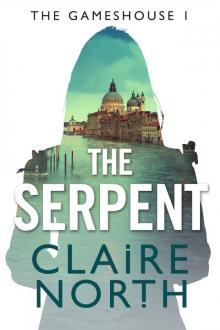 Gamehouse 01 - The Serpent
Gamehouse 01 - The Serpent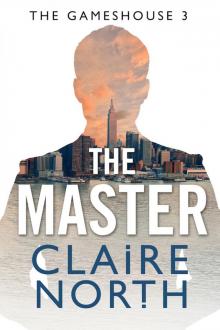 The Master
The Master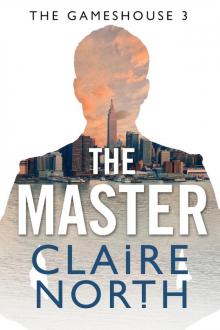 Gamehouse 03 - The Master
Gamehouse 03 - The Master The Thief
The Thief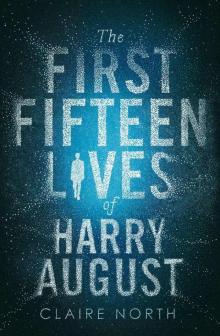 The First Fifteen Lives of Harry August
The First Fifteen Lives of Harry August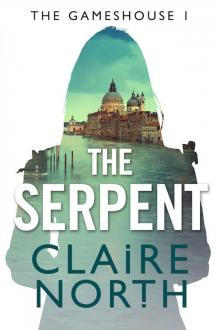 The Serpent
The Serpent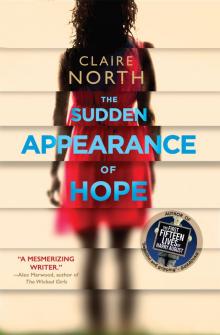 The Sudden Appearance of Hope
The Sudden Appearance of Hope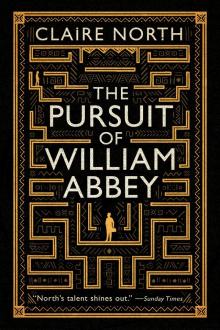 The Pursuit of William Abbey
The Pursuit of William Abbey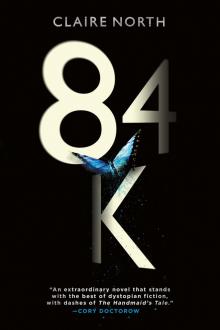 84k
84k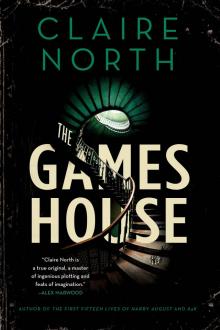 The Gameshouse
The Gameshouse Touch
Touch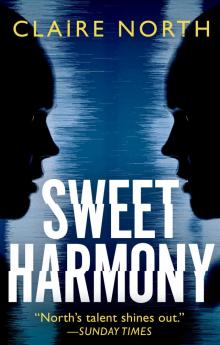 Sweet Harmony
Sweet Harmony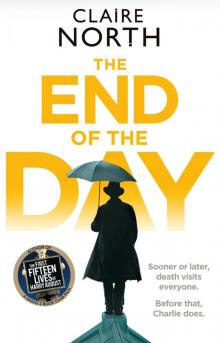 The End of the Day
The End of the Day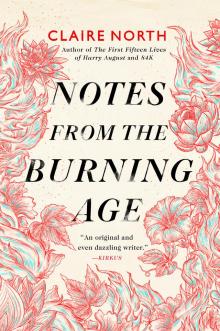 Notes from the Burning Age
Notes from the Burning Age